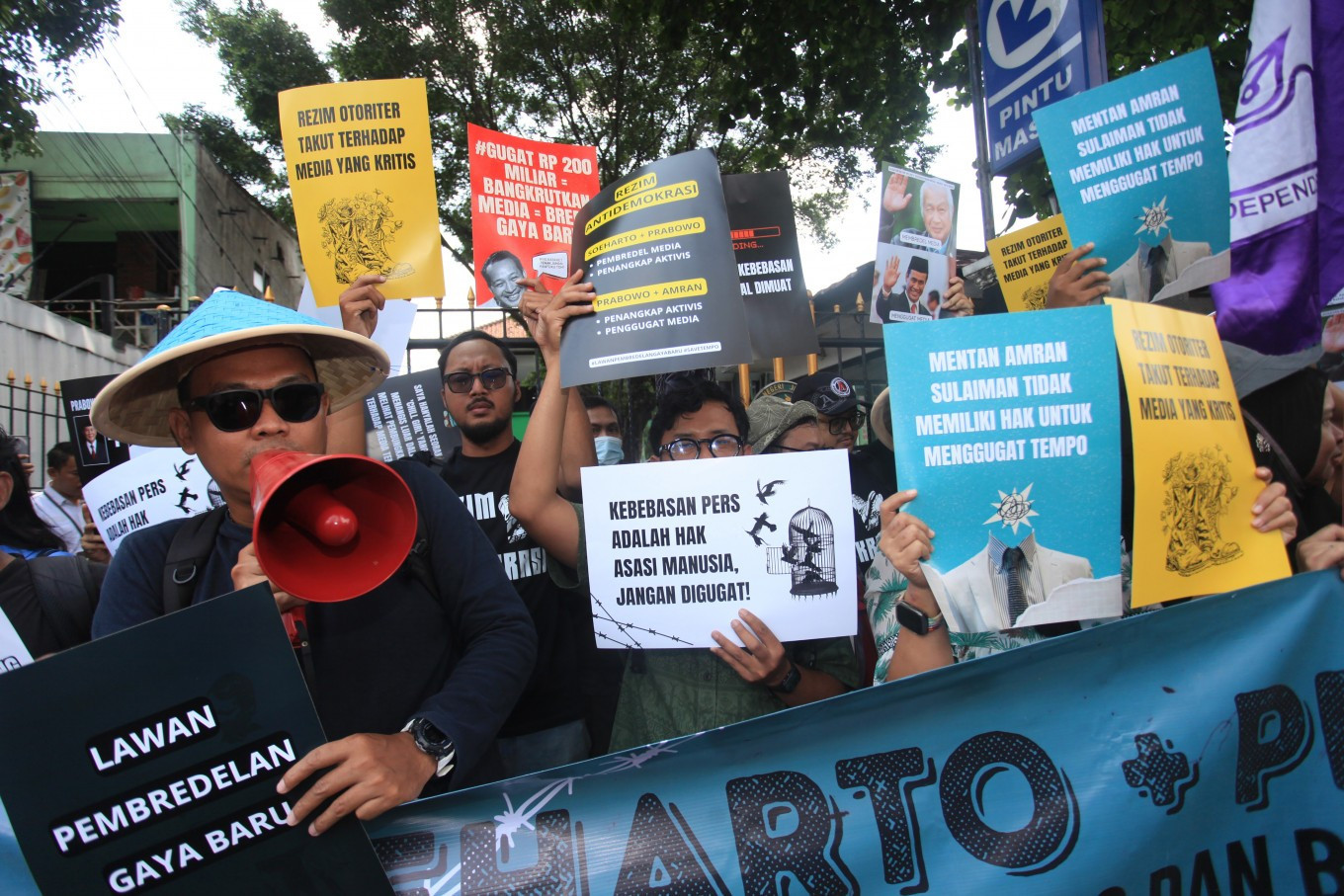News
Agriculture minister leads attack on press freedom
Tenggara Strategics November 17, 2025 Activists stage a solidarity rally for Tempo magazine on Nov. 3 in front of the South Jakarta District Court where a lawsuit filed by the Agriculture Ministry against Tempo is entering its 10th session. (Antara/Reno Esnir)
Activists stage a solidarity rally for Tempo magazine on Nov. 3 in front of the South Jakarta District Court where a lawsuit filed by the Agriculture Ministry against Tempo is entering its 10th session. (Antara/Reno Esnir)
The Rp 200 billion (US$12 million) civil lawsuit against Tempo magazine now being heard at the South Jakarta District Court has all the hallmarks of a concerted government campaign to silence critical media. The suit, filed by Agriculture Minister Amran Sulaiman, is so weak that the court should have dismissed it with prejudice.
That it is hearing the case, as well as the staggering amount of compensation being sought, suggests a more sinister agenda at work. The press community, led by the Alliance of Independent Journalists (AJI), has quickly caught wind of the broader danger the case poses to press freedom, and has organized many protests to rally support for Tempo and to get the court to drop the case.
President Prabowo Subianto has the power to order the minister to drop the case if he wants to, but then this is a President who is not known for respecting press freedom. Amran has filed the lawsuit in his official capacity on behalf of the ministry. It would have been a different story if he had filed for criminal defamation, which would be a personal issue and thus something in which the President could not intervene.
In addition, the Press Council has been surprisingly silent. The council had already ruled on the very matter brought in the lawsuit when it was submitted for arbitration. In fact, Amran filed the civil suit claiming that the magazine had not carried out the council's ruling, ordering Tempo to rectify a contentious opinion piece on the rice collected and distributed by the Agriculture Ministry. The Tempo editorial in question was originally titled "Stinky rice", but it has since been modified to the less offensive "Sticky rice", as ordered by the council.
The lawsuit essentially boils down to an interpretation of whether Tempo had carried out the council's order. In this context, the Rp 200 billion settlement sought seems outrageous and arbitrary, as this amount does not represent financial losses suffered by any party.
Tempo does not have that kind of money, and if the court decides against the publication, such a move would surely bankrupt one of the few remaining critical media outlets in the country.
The case has apparently had a chilling effect on the rest of the profession, according to journalists. Most media outlets are already struggling to stay afloat financially due to fierce competition, so they cannot afford legal and court fees, let alone pay compensation if they lose a court case. And more state officials would be emboldened to attack media critical of their policies, thanks to this case.
Tempo said its efforts to reach an out-of-court settlement failed because Amran either did not attend or send representatives to meet and discuss the matter on at least five occasions. His decision to take it to court instead signals that he is not interested in a settlement, but that he is bent in bankrupting Tempo.
This is not unlike the methods used very effectively to control the press during the Soeharto regime: threatening to close media outlets critical of the government. Newspapers at the time were required to obtain a publishing license, which came with so many restrictions that it limited their freedom. A mistake could mean losing their license and the company shutting down.
Under that past system, media outlets practiced self-censorship. Few dared to take risks, and those who did sometimes paid the ultimate price. Tempo lost its publishing license and closed in 1994 over its report on irregularities in the procurement of Navy vessels from Germany, led by then-technology minister B.J. Habibie.
In 1997, The Jakarta Post faced a US$300 million lawsuit filed by Habibie over a report alleging human error when the CN-235 prototype he designed crashed during a test flight. Habibie was then also CEO of IPTN, the national aircraft company that developed the small plane.
The sum he sought in his legal motion was the value of a CN-235 procurement contract with Abu Dhabi that was canceled after the accident. The court case was dropped when Habibie became vice president in March 1998 and was subsequently elevated to the presidency two months later, after Soeharto quit under pressure from a people's power movement.
What we've heard
Two people close to Amran who are familiar with the matter said the Minister filed the lawsuit because he believes Tempo consistently publishes negative coverage about the agricultural sector, particularly about him. They said an internal review of Tempo's reporting on Amran revealed that approximately 70 percent of the coverage carried a negative tone. "The analysis showed that the tone of reporting was always negative," one of them said.

